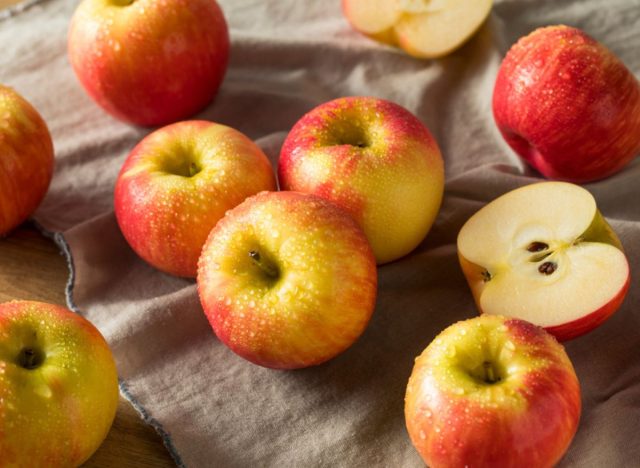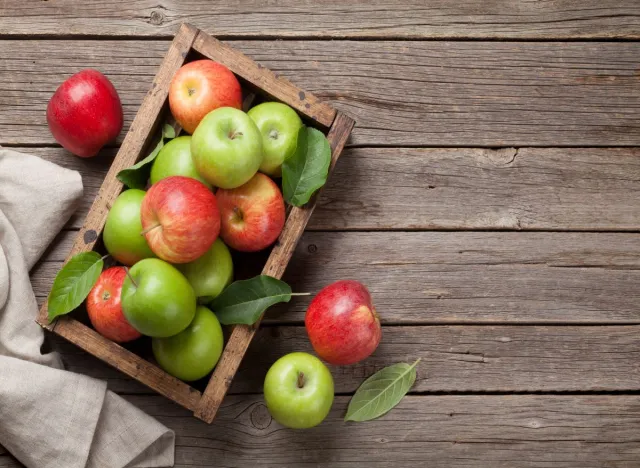Are Apples Good for You? Here Are 9 Science-Backed Benefits

Improving your health shouldn't be a chore; in fact, a popular food you probably already have at home could play a significant role in reducing your risk of chronic disease and supporting overall health. Multiple studies reveal that eating apples is good for you and can benefit virtually every part of your body, which means that eating an apple a day may truly help keep the doctor away.
Apples are full of helpful nutrients, and they're particularly high in fiber compared to some other fruits. Because of their unique blend of vitamins, minerals, compounds, and nutrients, apples have been found to help with things like weight management, diabetes risk, brain and heart health, and even dental health.
Whether you prefer a tart Granny Smith or a sweet Honeycrisp, read on to discover the surprising benefits of apples. And if you're in need of more healthy eating tips, check out Is Peanut Butter Good For You? 20 Effects of Eating It.
Apple nutrition facts
- Calories: 126
- Fat: 0.6 grams
- Carbs: 33.4 grams
- Fiber: 5.8
- Sugar: 25.1
Apples also contain helpful vitamins and compounds such as vitamin C, vitamin K, potassium, beta carotene, folate, and lutein.
9 science-backed apple benefits
Apples can help you lose weight.

Apples are good for you in many ways, and one of the things they can help with is providing nutrients that can aid in weight loss or weight management. According to a report published in the American Journal of Clinical Nutrition, eating whole apples was found to help reduce appetite. Reduction in appetite can help weight management because if you're feeling full and satiated, you're likely to consume fewer calories.
Another report from the Journal of the American College of Nutrition states that the polyphenols—a naturally occurring antioxidant—found in apples can help with weight loss and even have anti-obesity effects.
They can help reduce the risk of diabetes.
Another science-backed health benefit of eating apples is the possible ability to help reduce diabetes risk. According to a study published in Food & Function, eating apples or pears was associated with a decreased risk of developing type 2 diabetes—up to an 18% risk decrease to be exact. Not only that, but even eating just one serving of an apple or pear per week was linked to a 3% risk decrease.
And, speaking of the polyphenols that can help with weight management, a report published in Nutrition Bulletin states that these plant compounds found in apples are associated with protection against things like diabetes and heart disease.
They contain quercetin, a chemical that can support brain health.
Apples contain a specific type of polyphenol called quercetin, which is a pigment found in many other types of fruit and vegetables. Aside from giving apples their bright coloring, quercetin can help with a multitude of areas related to your health. Quercetin has been found to have antioxidant effects, which means it can help your body fight oxidative stress damage as you age. This can help with overall inflammatory issues, but specifically can help fight against Alzheimer's disease and dementia, according to the journal Foods.
Along with these brain-boosting benefits, the Foods review states that quercetin has been used for its anticancer, anti-inflammatory, and antiviral properties, and can also potentially help protect against cardiovascular issues as well.
They can improve your heart health.

Adding a few apples to your diet can do more than make your taste buds happy—it can keep your heart significantly healthier as well. According to a 2019 study published in The American Journal of Clinical Nutrition, individuals with mildly high cholesterol who consumed two apples a day reduced their LDL, or "bad" cholesterol, and increased their blood vessel dilation, which can reduce heart disease risk.
They can lower your blood pressure.
If you're eager to get your blood pressure into a healthier range, eating an apple every now and then might just be the easiest way to do it. A 2020 study published in Scientific Reports found that flavanol-rich foods, including apples, can help lower blood pressure.
Along with helping to lower blood pressure, the journal Molecules states that flavanols can have anticancer, anti-inflammatory, and antiviral properties as well.
They can improve your gut bacteria.
Healthy digestion and a healthy immune system start in the same place: your gut. Luckily, eating apples on a regular basis can help boost your beneficial gut bacteria. According to a 2017 study published in Nutrients, consumption of different types of apples, including Pink Lady, Golden Delicious, and Renetta Canada, increased the population of beneficial Actinobacteria within study subjects' guts. Actinobacteria is known as one of the major components of the microbiota and are necessary for overall gut health and harmony.
Apples can help protect your dental health.

An apple a day doesn't just keep the doctor away—it may keep the dentist away, too. According to a 2018 study published in PLoS One, while eating apples doesn't remove plaque from teeth, it does reduce the bacterial viability in a person's mouth, potentially keeping those pearly whites healthier and less prone to degradation over time.
They can make your breath better.
Instead of grabbing your toothbrush immediately after eating a garlicky food, try grabbing an apple instead. A 2016 study published in the Journal of Food Science reveals that eating an apple after consuming garlic can significantly reduce the enzymes in the garlic that promote bad breath. Who would have guessed that there were multiple oral hygiene-related apple benefits?
Eating apples may help reduce your risk of certain cancers.
Something as simple as eating an apple could help you significantly lower your risk of certain types of cancer. A 2009 study published in Reviews on Environmental Health found that eating one or more apple a day significantly lowered a person's colorectal cancer risk, while a 2015 meta-analysis published in the journal Public Health Nutrition found that apple consumption was associated with a reduction in lung cancer risk.
A previous version of this story was published on June 2, 2022. It has been fact-checked and updated with additional entries and information.
- Source: https://www.sciencedirect.com/science/article/pii/S0022316622023586?via%3Dihub
- Source: https://www.tandfonline.com/doi/abs/10.1080/07315724.2018.1447411?journalCode=uacn20
- Source: https://pubs.rsc.org/en/content/articlelanding/2017/FO/C6FO01378C
- Source: https://www.ncbi.nlm.nih.gov/pmc/articles/PMC5601283/
- Source: https://academic.oup.com/ajcn/article/111/2/307/5675325
- Source: https://www.ahajournals.org/doi/full/10.1161/01.CIR.101.16.1899
- Source: https://www.ncbi.nlm.nih.gov/pmc/articles/PMC7697716/#:~:text=Flavonoids%20possess%20a%20number%20of,of%20action%2C%20and%20its%20bioavailability.
- Source: https://www.dldjournalonline.com/article/S1590-8658(18)30210-X/fulltext









